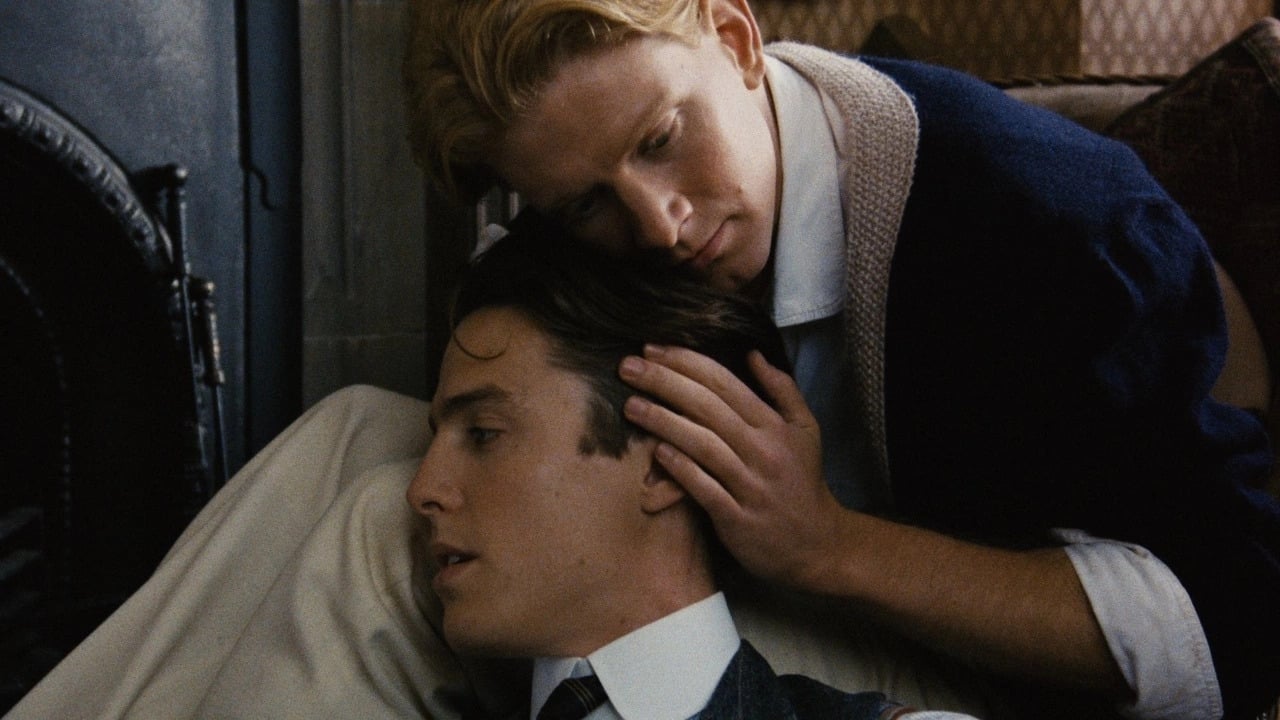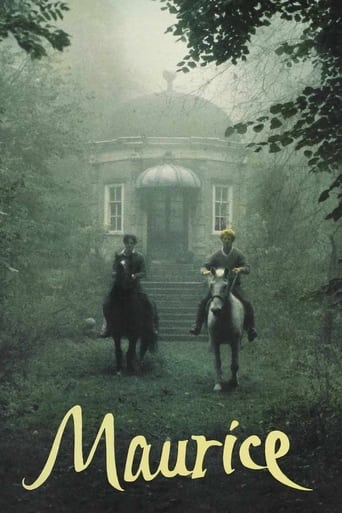



Lack of good storyline.
I wanted to like it more than I actually did... But much of the humor totally escaped me and I walked out only mildly impressed.
View MoreI didn’t really have many expectations going into the movie (good or bad), but I actually really enjoyed it. I really liked the characters and the banter between them.
View MoreOne of the best movies of the year! Incredible from the beginning to the end.
View MoreWhile I liked the first half of Maurice, I absolutely sat up with the second portion. If you can make it through the pompous, arrogant and snotty people of the first hour, you're in for a great all-around coming out story.Here's another movie I watched consistently when I was in my young, gay, formable years. Maybe once every 2-3 months. It's slow, yes. It's a period piece film, sure. And it's hard to get through at times but if you can stick through to the end – hell, the second half, it's well worth it.Maybe because, when I was younger, I fell in love with Rupert Graves, due to this movie. Now, I liked his character in this movie, Alec Scudder, but physically Again, this was in my impressionable years when I first started watching this. I even wanted to name my child – if I ever had one: Alec. Love(d) that name.I digress, as I normally do. The movie is set in England, the early 1910s. It's based on an E.M. Forster (of A Room with a View fame) book that was set to be released only after Forster was deceased. (I read this book, by the way and loved it.) Poor Morris (James Wilby and that's how it was pronounced back then;) in his own formable years in "college," he meets Hugh Grant's Clive Durham and they build a solid love affair in a time when someone caught doing homosexual acts could be imprisoned. Mercifully, England, unlike their child, the great U.S. of A., has turned it around since then. In fact, recently, they allow same-sex marriages. Kudos to them for being so advanced!Meanwhile, when another colleague of theirs is, in fact, imprisoned, Clive retreats and wrongfully marries a woman and ditches Maurice. He's distraught, definitely confused and seeks out "change" when he meets the man (of my own dreams following) who will prove to him: NOTHING IS WRONG.This movie helped me through a lot back then. Sure, at the time I first discovered it, it was set in a time eight decades prior, and in another country, but it was absolutely relevant to me and my own story. For, I didn't come out until gays finally started to earn the slightest of respect, in the early 1990s. Me, like Maurice, both didn't understand what was happening to us. No one told me what to expect, if there were others out there like me or if I was right or wrong.Remember: this was all pre-internet.This movie was well-made, had a great score and watching it from beginning to end, it's very touching and reminds me, with every viewing, of my youth. I'm glad I saw it back then, and look forward to seeing it again.
View MoreIt is difficult to speak of a classic and this film is one. E.M. Forster is also an English writer who has tact and some natural nobility. He makes radiant any subject he touches. And this subject is delicate if not difficult. It was when the book came out and it still was when the film came out. Nowadays it has lost its smell of sulphur and hell and in spite of all the tricksters and mud-throwers around it smells of love and it carries a strong appeal for those who just have a mind.We cannot avoid thinking of Lady Chatterley's Lover but we are no longer dealing with a woman but with a man, with straight love but with gay love and it is necessary to give a general idea of the story for any commentary to make sense. It starts at Cambridge when two young men fall in love, Clive declaring his love to the other and this other, Maurice, being repulsed at first and then apologizing and accepting his attraction. The point is that the one who declared his love first is the aristocrat whereas the other is from a stock exchange family. And that's the latter's first loss. He is cleanly and immediately kicked out of Cambridge because he missed a few classes to spend the afternoon with Clive and refuses to apologize to the Dean.But another of their university mates, Viscount Risley, managed to get in some kind of fix in an East End pub one night when he buys some quick pleasure from a cadet in a back alley. He is "captured" by the police and dragged to court. This Viscount is a Parliamentary Private Secretary and is at the start of a political career. He is abandoned by every one, including Clive, and the judge condemns him lightly as for the prison term but ruins his political career forever with the clear mention that "instead of setting an example to the people", he looked for favours from people who were his "inferiors" and he used his advantageous superiority in education to do so.This reveals the deeply social segregational attitude of England then. The social difference made such a relationship unacceptable to justice with a strong emphasis on this social barrier that the culprit dared cross.That makes Clive change his position entirely. He decides to drop Maurice, apart from a platonic friendship and to marry a girl who is full of love but not too subtle on the real emotions of her husband. This rebuff from Clive sends Maurice to hell and he tries to find a way out with doctors and even a hypnotist who comes up with the fair advice to move to a country like France where homosexuality is accepted. And his conclusion is final: "England has always been disinclined to accept human nature." But in the meantime Maurice falls in love with Clive's gamekeeper, Alec. In fact it seems the gamekeeper smelled the possible emotional opening in Maurice and Maurice did not rebuff him and then Alec moved forward and Maurice let him do so. The love is strong but Maurice is afraid of some blackmail, and yet he goes on as far as possible before Alec leaves England for Argentina. But Maurice will find out the ship leaves without Alec and he will run back to Clive's place and will subodorate that Alec is waiting for him in the boathouse and sure enough here he is.The first element is that E.M. Forster's novel was one essential milestone on the slow and long road that led England to two fundamental mental reforms. The first one has to do with gay love and England was not the first country to move on such a subject after WW2 but in fact they moved rather fast though they still have some way to go. But the second mental reform is far from being complete. It is social segregation. In 1910-1913 when the action takes place that social segregation is absolute: the relation, between the aristocracy and the lower classes were absolutely not acceptable in any way, particularly of course emotionally, sentimentally or sexually. D.H. Lawrence had proved it with his above-quoted novel for women and E.M. Forster proved it with this here novel and film.The arguments emphasized by the judge are absolutely univocal: a member of the nobility could not in any way have any kind of an affair with someone from a lower social station. The fact that at the same time the Anglican church and the society as a whole condemned gay love and gay sex as immoral and un-natural if not anti-natural, does not in anyway alleviate the horror of that social discrimination in people's sentimental, emotional and sexual private lives. And at the same time it is this very fact that this social discrimination is a lot more powerful than the moral condemnation that gives Maurice and Alec a possible choice, a possible chance.Alec could miss his ship because he wanted to stay with Maurice, that was his free choice, and Maurice could run after him blindly because he wanted Alec to stay and be part of his life, and that was also his free choice, and that is in a way possible for them both because Maurice is working at the Stock Exchange, in a brokerage house and he is not in anyway part of the nobility and aristocracy. That's their chance and Alec could become in a way or another some employee of Maurice's and then the rest was discretion and love. And eventually they could move to another country.Dr Jacques COULARDEAU
View MoreFirst of all, I can't believe this movie was made in 1987!This has more passion, emotion and sensuality in it than most romance movies of the 2000's. This bittersweet but tender love story managed to get my attention all along (I didn't even notice that it's longer than an average movie-140 min.) and marvelously get's it's message across without being too explicit. This highly emotional love story is built around three characters and explores the problem of homosexuality in 19th century England. The main character is Maurice Hall,as the title suggests, who comes to terms with his sexuality, when love develops between him and his college best friend, Clive Durham. After rejection, deception and huge efforts to become what is considered "normal", he finally finds comfort in the arms of the Durham household's gamekeeper. Although all the performances were excellent, it was Alec Scudder's character that I found the more interesting. Rupert Graves did an excellent job portraying this rough yet sensitive country boy, who's sincere love for a high class gentleman seems impossible at first. A bit brash, yet charming, this low class lad falls desperately in love with Mr. Durham's (almost) permanent guest, who initially, despite Scudder's numerous signals, doesn't seem to remark his more than obvious affection. His glances, the clumsy conversations, the overjoyed remark that Scudder makes after Mr. Hall's unexpectedly quick return to the estate, as well as the passionate love letters addressed to Maurice after their first "sharing", show the honesty and depth of Scudder's affection, excluding any chance of blackmailing and desire for profit - as both the viewer and Maurice might have suspected. Compared to Clive Durham, who is unable to face his sexuality and hides behind a hollow marriage, Scudder stands as a vivid character, comfortable with who he is,and who's faithfulness and unconditional love manages to win Maurice's heart.
View MoreThis film is about a upper class English gentleman called Maurice, and his quest to find the love of his life beyond the societal constraints of Britain in early 1900's.Though the pacing of "Maurice" is very slow, it successfully engages the viewers and hence never feels boring. The main characters, Maurice Hall and Clive Durham are very well developed. Their words, emotions and actions are beautifully portrayed in much detail that I feel close to them. Maurice Hall's immense dedication to find love in Clive is intense, but their love does not come to fruition due to oppressive societal pressure. Though Maurice finally finds solace in Alec, the ending is bittersweet.
View More